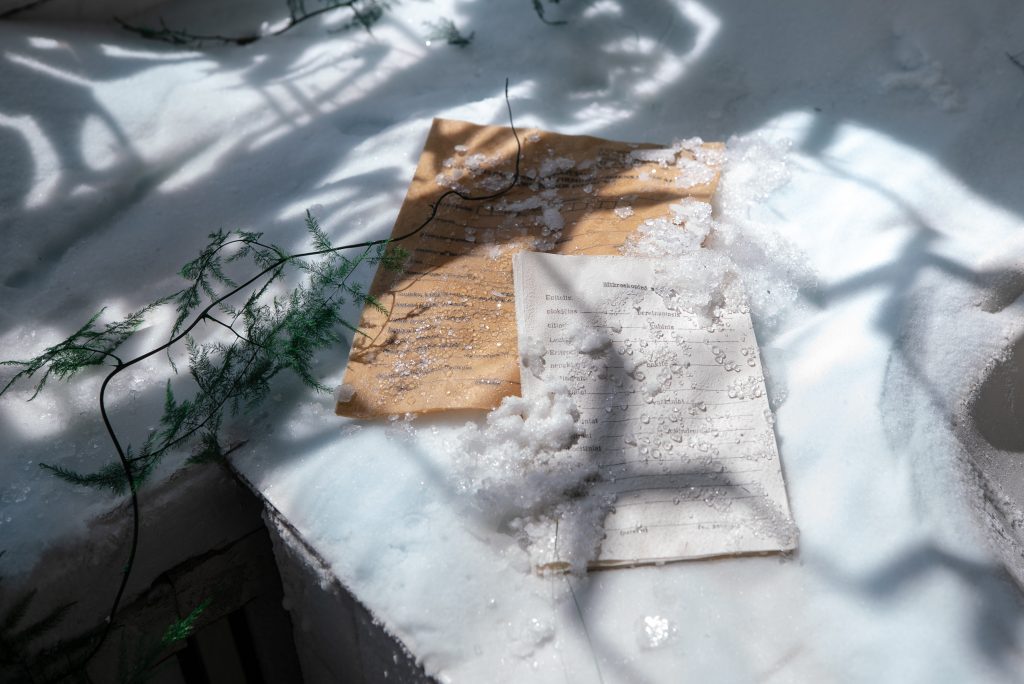Poem by Daniella Sanader

Poem by Daniella Sanader inspired by Bianca Bondi exhibition ‘Lilith’ which took place 26 May- 2 July 2022 at former sewing factory ‘Lelija’, Vilnius.
Two seconds from now,
you will have absorbed these words into your body, just as you have taken in this air through your lungs—soft, gauzy, a little bit sour.
Ten minutes from now,
this space will have forgotten you, but invariably, you will have left something of yourself behind: exhaled carbon dioxide, loose footprints on decorative tile, skin cells and strands of hair. The atmosphere subtly reconfigured to account for your temporary existence here.
Two hours from now,
the sweat from the summer heat will have been reabsorbed into your skin, producing a thin layer of salt and concrete.
Fifteen hours from now,
the remaining workers will return to the factory, feet treading soft channels through darkened hallways. Another shift where muscle memory is stitched through with thoughts of family, of pleasure and worry, of lunch and dinner, of days and weeks.
Ten days from now,
the walls and window frames will have thickened, imperceptibly, like the ongoing growth of your fingernails. Salt crystals forming dense architectures over medical diagrams, forgotten cardboard boxes that puff and bloat, rust clouding the hinges on an open suitcase. Protective barriers continue to be fortified.
Five weeks from now,
the plum pits you tossed in the tall grasses by the river will have begun their slow disintegration into the earth—their fleshy leftovers feeding ants, who in turn feed caterpillars, who in turn feed the birds heard singing loudly this morning, from an open window.
Twelve weeks from now,
the artist will have come and gone, having “dismantled” her installation into tidy boxes and crates, yet a fine grit will linger here. Salt swept into the seams between ceramic tiles, the sharp edges were walls meet countertops, behind the elbows of pipes and frosted windowpanes. Salt carried into the hallways and stairwells, into the winds of the city.
Eight months from now,
you will be elsewhere, and you will feel a damp grit beneath the soles of your feet and briefly, quietly, you will remember this place, the way thin branches traced sentences across the powdery surfaces of an unused medical office.
Five years from now,
elastic bands will have crumbled, stalks of poppies dried in thin slivers, pools of liquid evaporated into the air, sticky with sediment. Gelatin pill capsules flattened and wrinkly like old down-filled pillows.
Thirty-four years from now,
perhaps the factory will be bustling with activity again, perhaps it will be empty and forgotten, perhaps it will be gentrified, torn down, redesigned, squatted, revitalized. Perhaps it will be exactly the same. You cannot know for sure, but salt crystals will continue to metabolize in the atmosphere, forming clusters with fibres of discarded surgical masks.
One hundred years from now,
the words on the pages will congeal together, soupy and entangled with microplastics and flakes of chrome, forming a new language that has yet to find its readers.
Five hundred years from now,
something new will blossom on the windowsill here, accidental and sudden, like how penicillin was discovered. It will be perfect, it will be exactly what we need, it will be too wonderful to even fathom, but it will not be ours to find.
One thousand years from now,
those of us left behind will have no memory of the city, or of other impermanent things like money and borders and parking lots and workplace injury reports and mythology. Shards of ceramic tile will crumble further into dust, and small creatures will wind their soft bodies through the mineral deposits—history divided with a gentle curve.
Three thousand years from now,
oxidation, then reproduction, then digestion, then alchemy. Salt will cling to the edges of riverbeds.
Sixteen thousand years from now,
Eighty thousand years from now,
Two hundred thousand years from now,
Image: Bianca Bondi exhibition ‘Lilith’ 2022, Vilnius by Laurynas Skeisgiela